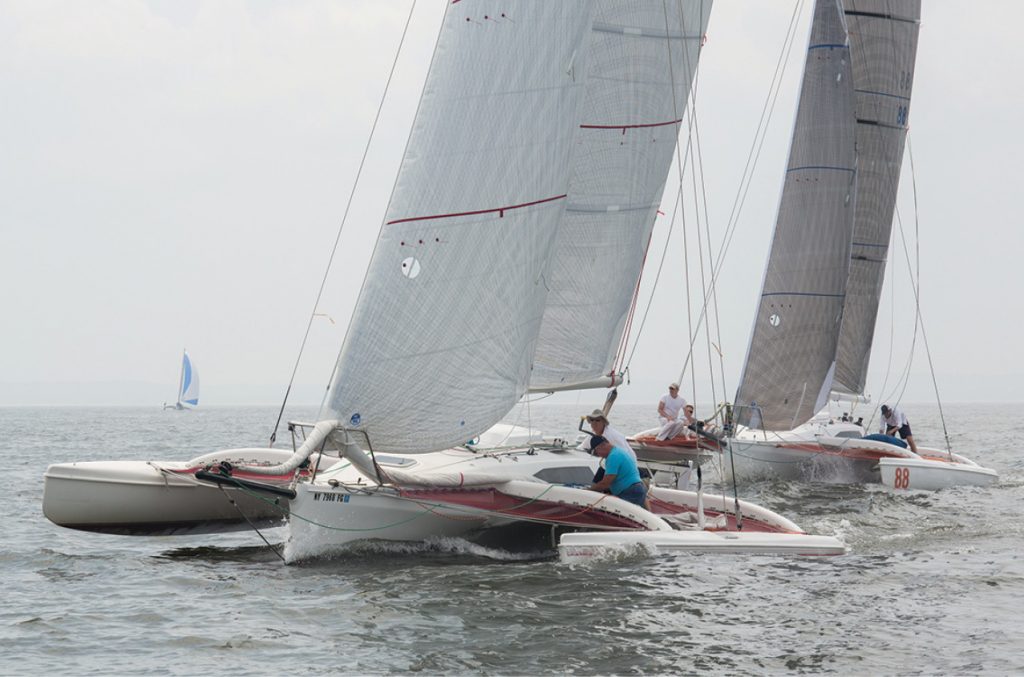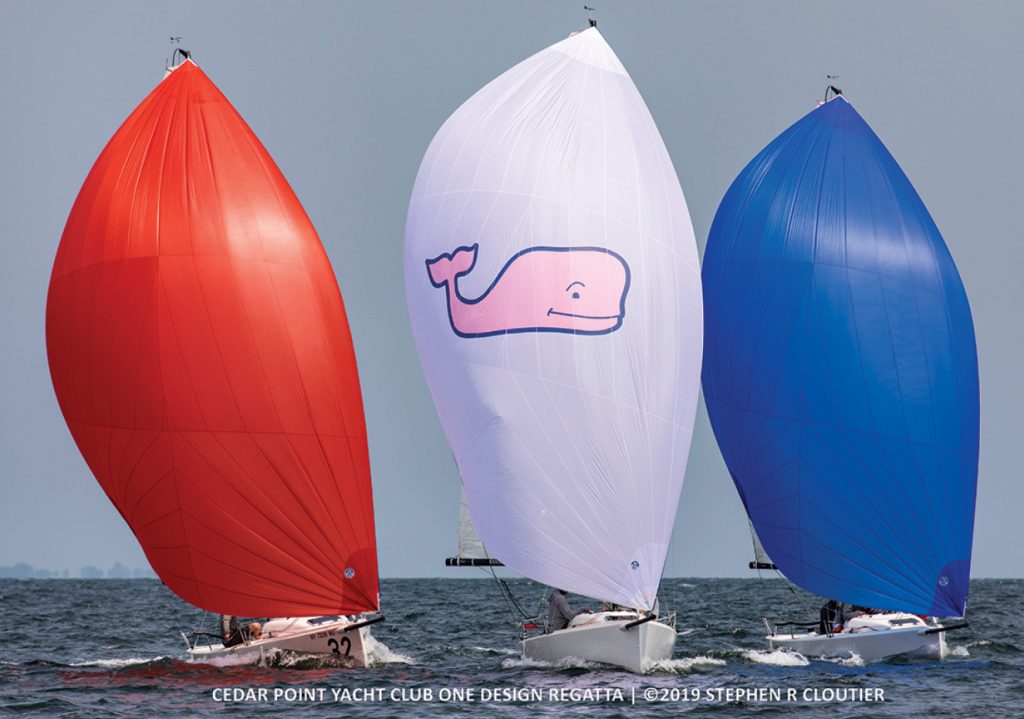By Ken Read
With another sailing season upon us, I feel excited and worried. I am excited for the high end of the sport… the IMOCA fleet, for example, as we have watched them push themselves, and each other, in new, cutting-edge ‘fliers’ across the Atlantic. The America’s Cup – these boats are going to be fast and furious and who knows what is going to happen with these crazy new machines. The Moth Worlds showed us a form of singlehanded sailing with radical new top speeds in the big breeze off Perth. And of course another round of the 100-footers battling in yet another Rolex Sydney Hobart. I could go on and on and on. There is much to look forward to and so much going on.
But I feel compelled to write about something more fundamental that I am really worried about and which affects all of us who sail as a sport. Time is of the essence. Not just for change to our sport, but substantive change that can allow people to enjoy racing but at the same time not feel as if they are wasting precious time that could be used far more productively. How do we buck the trend of declining participation and make sure we are inspiring the next generation of kids into the sport? Because at the moment we are losing the fight for the future.
My simple view? Perfection is killing sailboat racing. We are negating our momentum in search of perfection and it’s happening everywhere. Every one of these following measures can be done this year, next summer, any time by any yacht club, sailing association or world championship race committee. All you have to do is have an open mind and try.
The basic premise? Sailing takes up way too much time. Time that we could be spending with our families, working, playing, relaxing and so on. Activities like sailing battle for our precious time. In modern society, time is proving one of our most precious commodities. There is no one golden bullet, but if implemented we do have options for a quick fix as the sport has to compete for time in all of our hectic lives.
Make schedules flexible. There is more good weather information and weather apps for a given sailing area than ever before in history. And it is easier to communicate to large groups than any time in history. So use them both.
With the goal of having better sailing and not wasting people’s time, the night before a race day send out a note to the entire fleet telling them when racing will start and probably conclude the next day. An announcement at 2100 hours every night before racing the next day. Instead of everyone showing up and automatically heading out for an 1100 start that everyone knows isn’t going to happen because the seabreeze isn’t going to fill until 1300…tell people to stay in bed!
Change the rules to work out a ‘live’ window the night before for racing the next day. For example: ‘Racing starts at 1400 and finishes at 1900’. ‘Racing starts at 0830 and finishes at 1200’. Or ‘Racing starts tomorrow on the posted scheduled times’.
Why can’t we give people a race window for the next day based on accurate weather forecasting and free up people’s time to do other things the rest of the day? Imagine if flex scheduling told you that the next morning was free and the racing was to start at 1300. Round of golf? Go to the kids’ soccer game? A bit of work to do? Family breakfast? Anything but floating around waiting or showing up at the boat at 0830, to be told we are waiting an hour on the dock for the next announcement as to when we are sailing. UGGGGH!

No more postponement flags, says the author. If there’s enough breeze to fly it, there’s enough breeze to sail! © Laurent Apollon Images
Flex scheduling can work for any and all types of racing. No more drifting around to wait and getting cooked by the sun. Sure, every once in a while the weather isn’t going to be perfect and you may miss a morning of decent sailing. But let’s just say one out of ten are bad weather forecast days. That still leaves nine good time-saving days that have saved hundreds of people literally thousands of man-hours to do things other than be bored to death and tell the same stories for the fiftieth time.
Get rid of the postponement flag. I really believe we have to put the postponement flag away – forever. From world championships to beer-can races, Optis to superyachts, we need to get races started on time. Whether it be to get sailing on primetime TV or so that families can schedule sailing into their busy day or weekend. We can’t afford to sit around and wait any more. The postponement flag is an excuse. Eliminate it. And there would be a trickledown effect that would be fantastic for the sport. There are essentially three reasons a postponement flag is used. The RC isn’t ready, the weather isn’t cooperating and a set racecourse is crooked, or the starting line isn’t perfect. When the Race Committee is not ready I have no comment really. If you are the Race Committee and you are telling a fleet of boats to be at a course at a given time, then don’t be late.
Weather holding up a race? Is the fleet cranky if the racecourse isn’t a perfect windward-leeward within a degree or two? I have a suggestion. When you are on the water…SAIL!
If organizers have forecast a window, there should be no reason that the weather isn’t at least pretty good. Odds are there is going to be some breeze. But the point is that even if there is just a breath of wind it’s the same for everyone. I can’t tell you the number of times that we have been dialing up to a start and we are postponed to wait for the breeze to ‘settle.’ Just start!
Not only will you get more races in, which equals more fun (and that is what everyone came for), but also the same person is going to win overall if the starting line is skewed 25° or the weather leg is a one-way track. Or maybe it gives someone else a fighting chance. If it turns into a really skewed racecourse shorten it, count it and start again. Never cancel a race that is underway! And maybe it will mean we start doing some more non-traditional things like a downwind or reaching start or something else creative that might be fun. Just start the race, get people going. Drifter? Start the race, shorten the course, go to a new mark. Marginally too windy? Take a reef. If you are afloat, the race starts on time. Period. No more delays.
And with regards to the starting line, onboard computers have created an environment that forces race officers to try to be perfect. We complain if a starting line is 5° ‘off.’ We complain if a racecourse isn’t perfectly lined up to the breeze when the reality is as long as it’s the same for everyone. It doesn’t matter. Start the race! Wind shift and the line is 30° off? So what!! If you can’t cross on starboard – so what! Makes for some interesting scenarios. A shift right before the start means that the person paying attention is going to win the start anyway. Just send the fleet.
One quick side note: a message to the America’s Cup. Let’s talk about upper and lower wind limits… During my America’s Cup tenure I can’t tell you how many times we were towed back into port after a race was cancelled due to the ‘upper wind limit’ being reached and towing back in through an Opti regatta happening and the kids flying around whooping with enjoyment. Or have you ever tried to commentate on live global TV with the opportunity to show some of the coolest boats on the planet in windy conditions, only to have the race shut off because the breeze was one knot above (or below) the stated rule requirements? I have. About a thousand times.

Why not maximize racing time – and fun! – with informal sprints out to the starting area and then back to the dock? © Stephen R Cloutier
No more upper or lower wind limits. If the principal race officer thinks you can race, then race. And the PRO should be given a LOT of latitude to race in almost any conditions. No waiting in fluky conditions. Send them! When it gets dangerous, fine, but up to that point, get out there and show off the best of our sport.
Reduce the need for so many boats and volunteers to run races. I know well that volunteers are a hard ask for any sailing club or association trying to run a race or regatta. I recently did a ClubSwan 50 event and they used really cool self-propelled, no-anchor, GPS-controlled race marks. They were working in current and good breeze and waves and it made for simple racecourse adjustments and far fewer people needed to run the races. If you are a starting-line perfectionist PRO, this gives you free reign to move the mark up to about five minutes before the start and still allow people to ping the pin.
Fewer people. Fewer anchor lines. Fewer boats needed. Less fuel. I couldn’t believe how something like this wouldn’t be cost- effective for all yacht clubs around the globe. And please put an AIS unit on the committee boat and the pin so we don’t have to ‘ping’ any more. Pinging is becoming one of the most dangerous parts of racing!
Please race out to the starting area and in from the finish area. Make more races count. Why are we sailing or motoring for an hour out to the racecourse and an hour back? Wasting time. Make it a simple point-to-point race or around a few government marks and finish at the posted starting area. Don’t waste time. Sailboat racing is called racing and it’s not called sailboat delivering.
I love sailing. It is my passion, my hobby, my job. I have been lucky enough to do pretty much every type of sailing in my life, and I feel so strongly that we have an opportunity right now to change the trajectory of our sport and get more people involved by not wasting their time. At any level… Please, please, please give any or all of these ideas a try. Every organizing authority can implement these ideas, from the purely professional to the completely social side of sailing. ■
Ken Read is President of North Sails.
This article was originally published in Seahorse Magazine and is reprinted with permission. Special thanks to Graeme Beeson, Seahorse’s Advertising Director, and Bridgid Murphy, North Sails’ Global Head of Marketing & Communications.




